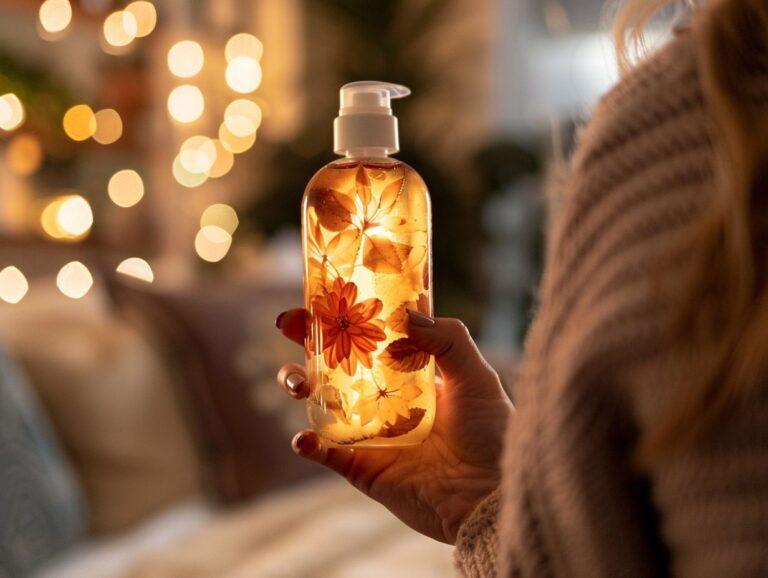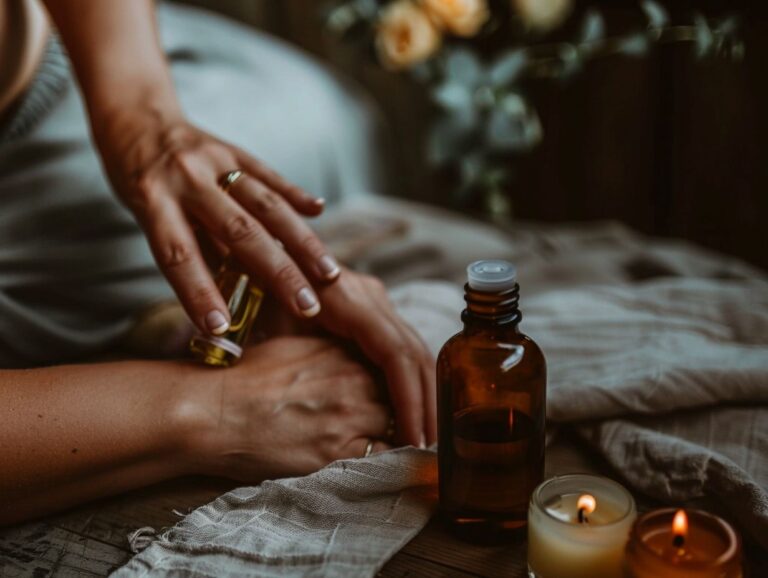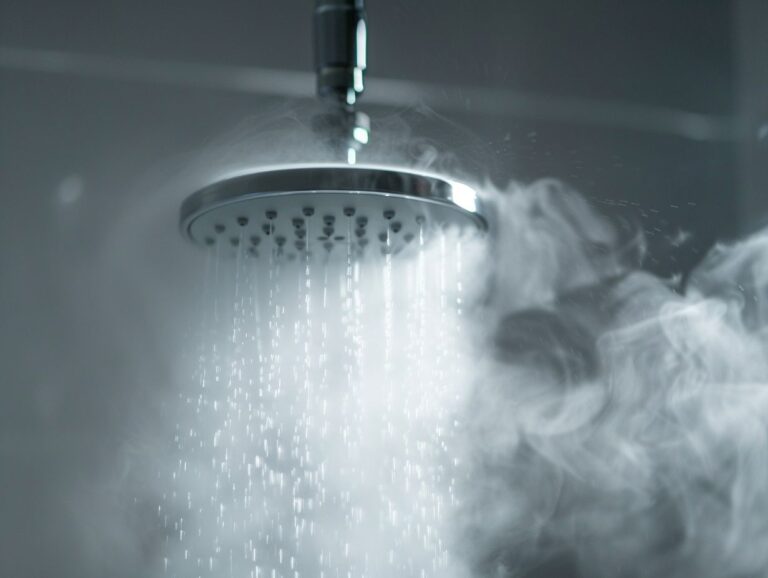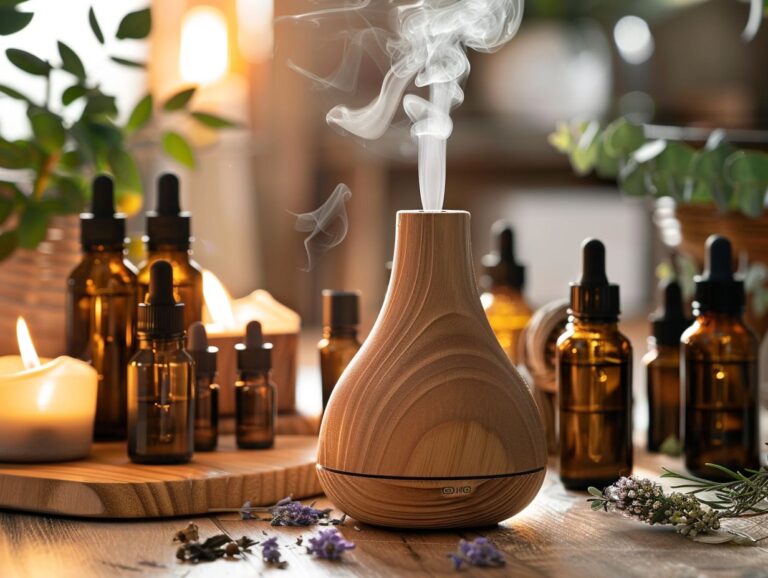Can Aromatherapy Help With Premenstrual Syndrome
Are you tired of dealing with the uncomfortable symptoms of premenstrual syndrome (PMS) every month?
PMS can wreak havoc on your well-being, from physical discomfort to emotional mood swings.
In this article, we will explore how aromatherapy can provide relief from PMS symptoms.
Discover the essential oils that can ease your discomfort and learn how to incorporate aromatherapy into your PMS treatment regimen.
Key Takeaways:
What is Premenstrual Syndrome (PMS)?
Premenstrual Syndrome (PMS) refers to a combination of physical and psychological symptoms experienced by many women during the menstrual cycle.
It is estimated that approximately 75% of women of childbearing age experience some form of PMS. The impact of Premenstrual Syndrome (PMS) on women’s health can vary from mild to severe, affecting their daily activities and quality of life. Common symptoms associated with PMS include bloating, mood swings, irritability, fatigue, and food cravings. Both the physical and psychological effects of PMS can greatly disrupt a woman’s routine and interpersonal relationships.
What are the Symptoms of PMS?
The symptoms of PMS can be categorized into physical and emotional manifestations that affect women differently each month.
Physical discomforts often experienced during PMS include menstrual cramps, bloating, breast tenderness, headaches, and fatigue. These symptoms can range from mild to severe, disrupting daily activities and causing discomfort. On the emotional side, mood swings, irritability, anxiety, and depression are common features of PMS. Women may find themselves feeling overwhelmed, emotional, or having difficulty concentrating. Both physical and emotional symptoms of PMS can impact overall well-being, affecting relationships, work performance, and quality of life.
Physical Symptoms of PMS
Physical symptoms of PMS encompass a range of discomforts such as menstrual cramps and bloating, which can be alleviated through natural remedies like lavender essential oil.
Menstrual cramps, often described as sharp or dull pains in the lower abdomen, are a common complaint during PMS. They can range from mild to severe, causing significant discomfort. Alongside cramps, bloating is another prevalent symptom characterized by a feeling of fullness and swelling in the abdominal area.
In terms of managing these physical symptoms naturally, the benefits of aromatherapy and essential oils like lavender are worth considering. Lavender essential oil, with its soothing properties, is known for its ability to relax muscles, reduce inflammation, and alleviate pain.
Emotional Symptoms of PMS
Emotional symptoms of PMS include mood swings, anxiety, and depression, which are linked to hormonal changes and neurotransmitter fluctuations in women.
During PMS, these emotional symptoms can be particularly challenging for individuals, affecting their daily functioning and quality of life. The hormonal influences on emotional well-being during this time are complex, with fluctuations in estrogen and progesterone levels impacting neurotransmitter activity in the brain.
Anxiety and depression can intensify during PMS due to these hormonal shifts, leading to increased feelings of tension, worry, and sadness. Mood swings can make it difficult to regulate emotions, causing rapid changes in feelings from one moment to the next.
One potential treatment approach for managing these emotional symptoms involves addressing neurotransmitter regulation through medications or natural remedies, such as supplements that support serotonin and GABA production in the brain.
What Causes PMS?

In terms of hormonal changes, fluctuations in estrogen and progesterone levels throughout the menstrual cycle play a significant role in the onset of PMS symptoms. Imbalances in these hormones can affect brain chemistry, leading to mood swings, irritability, and physical discomfort.
Neurotransmitter imbalances, such as changes in serotonin and dopamine levels, can further contribute to the emotional and physical symptoms experienced during PMS.
Disruptions in mood regulation mechanisms, including the interaction between hormones, neurotransmitters, and the central nervous system, can exacerbate the severity of PMS symptoms. The intricate interplay of these factors highlights the complexity of PMS causation and underscores the importance of conducting additional research to gain a deeper understanding of this condition.
How is PMS Diagnosed?
Diagnosing PMS often involves tracking symptoms over several menstrual cycles and utilizing standardized assessments like PMS scores to evaluate the severity and impact of symptoms on daily life.
During the diagnostic process for PMS, healthcare professionals may also conduct clinical trials to further understand the individual’s symptoms and their specific triggers. By identifying patterns and correlations between symptoms and various factors such as lifestyle habits, stress levels, and hormonal changes, clinicians can offer tailored management strategies.
Accurate diagnosis is crucial in effectively addressing PMS, as it lays the foundation for personalized treatment plans that target the root causes of the symptoms. Comprehensive evaluations help in differentiating PMS from other conditions with similar symptoms, ensuring appropriate interventions and better outcomes for individuals experiencing premenstrual challenges.
What are the Treatment Options for PMS?
Treatment options for PMS include a combination of medications to manage symptoms and lifestyle changes that address hormonal fluctuations and behavioral health.
Pharmaceutical interventions often involve the use of nonsteroidal anti-inflammatory drugs (NSAIDs) to alleviate physical discomfort like cramps and headaches. Some women benefit from hormonal medications such as birth control pills to regulate hormone levels and reduce symptoms. Lifestyle modifications, on the other hand, may include dietary changes, regular exercise, and stress management techniques to improve overall well-being.
Personalized care is crucial in determining the most effective treatment plan for each individual. Healthcare providers may recommend different approaches based on the unique symptom profile and personal preferences of the patient.
Medications for PMS
Medications prescribed for PMS management are often based on clinical trial evidence, with options that target neurotransmitters like GABA and serotonin to regulate mood and alleviate symptoms.
These medications work by modulating the levels of neurotransmitters in the brain, such as increasing inhibitory effects through GABA or enhancing the mood-stabilizing properties of serotonin. Clinical trials play a vital role in developing these pharmaceutical interventions, ensuring their efficacy and safety through rigorous testing before being prescribed to individuals suffering from PMS.
Lifestyle Changes for PMS
Incorporating lifestyle changes such as stress management techniques and enhancing women’s health practices can significantly impact PMS symptoms, especially in reproductive-age women.
Another key aspect of managing PMS through lifestyle modifications is focusing on fatigue alleviation. Ensuring adequate sleep, following a balanced diet rich in essential nutrients, and engaging in regular physical activity can help combat exhaustion and improve overall energy levels.
For women seeking ways to enhance their well-being and alleviate PMS discomfort, activities like yoga, meditation, or deep breathing exercises can be beneficial in reducing stress levels and promoting relaxation.
It is important for reproductive-age women to prioritize self-care and pay attention to their body’s needs during the menstrual cycle. Establishing a routine that includes time for rest, proper nutrition, and relaxation can have a positive impact on managing PMS symptoms and fostering overall women’s health.
What is Aromatherapy?

Aromatherapy is a holistic healing practice that utilizes essential oils like lavender to promote physical and psychological well-being through aromatic stimulation and topical application.
Essential oils, often derived from plants, flowers, and herbs, have been used for centuries in various cultures for their therapeutic properties.
These oils are believed to possess unique chemical components that can positively affect emotions, mood, cognitive function, and even physical health.
Practitioners of aromatherapy understand that inhaling these fragrant oils or applying them topically can trigger specific responses in the body and mind.
How Can Aromatherapy Help with PMS?
Aromatherapy has shown promise in alleviating PMS symptoms by using essential oils such as lavender oil to positively influence mood states and regulate autonomic nervous system activity.
These essential oils work through various mechanisms to provide relief from premenstrual symptoms. Lavender oil, in particular, has been found to have calming effects on the mind and body, helping to reduce stress and anxiety commonly associated with PMS. When inhaled, the aromatic compounds in lavender oil interact with the brain’s limbic system, which plays a crucial role in regulating emotions and responses to stress. This interaction can lead to a decrease in cortisol levels, promoting relaxation and a sense of well-being.
Essential Oils for PMS Symptoms
Essential oils like lavender and blends containing linalool have been studied for their efficacy in providing pain relief and alleviating PMS symptoms through aromatherapy applications.
Research indicates that lavender oil, with its calming and anti-inflammatory properties, can help reduce menstrual cramps and ease tension and stress commonly experienced during PMS. Linalool, a compound found in various essential oils, including lavender, has been linked to its analgesic effects which can assist in managing the discomfort associated with PMS. Studies have also shown that inhaling essential oils can positively impact mood and emotional well-being, contributing to overall PMS symptom management.
How to Use Aromatherapy for PMS Relief
Aromatherapy for PMS relief can be administered through methods like inhalation of lavender fragrance to address premenstrual emotional symptoms and modulate autonomic nerve activity.
Aromatherapy works by utilizing the powerful scents of essential oils, such as lavender, to impact the limbic system in the brain responsible for emotions, memory, and hormone regulation. By inhaling the aroma of lavender, women can experience a calming effect on their emotional state, reducing anxiety and mood swings commonly associated with PMS.
Plus inhalation, topical applications of lavender essential oil can provide localized relief for physical symptoms like cramps and headaches. Diluting lavender oil with a carrier oil and massaging it onto the abdomen or temples can help alleviate discomfort and promote relaxation.
Are There Any Risks or Side Effects of Using Aromatherapy for PMS?
While aromatherapy using lavender essential oil is generally safe, some individuals may experience mild skin reactions or respiratory sensitivity as potential side effects.
It is essential to consider safety precautions when using aromatherapy, especially for those using it to alleviate PMS symptoms. Individuals with sensitive skin should perform a patch test before applying lavender essential oil topically. Diluting the essential oil with a carrier oil like coconut or almond oil can help minimize the risk of skin irritation. Ensuring proper ventilation during aromatherapy sessions can reduce the likelihood of respiratory issues for those prone to sensitivities.
Conclusion

The effects of aromatherapy on PMS symptoms warrant further study and exploration to enhance women’s health and well-being during the menstrual cycle.
Aromatherapy, as a complementary practice, offers a range of potential benefits for managing PMS symptoms including reducing stress, alleviating pain, improving mood, and aiding relaxation. Essential oils such as lavender, chamomile, and rose have been traditionally used for their calming effects. These natural remedies can help in balancing hormones and promoting emotional well-being. While some studies suggest positive outcomes, ongoing research is vital to validate the effectiveness of aromatherapy in addressing PMS.
It is crucial to adopt holistic approaches that consider the mind-body connection in women’s health. Embracing practices like meditation, yoga, healthy nutrition, and adequate rest alongside aromatherapy can contribute to a more comprehensive approach to managing premenstrual challenges. By integrating various wellness strategies, women can enable themselves to navigate through hormonal fluctuations with greater ease and promote overall well-being.
Frequently Asked Questions
Can aromatherapy help with premenstrual syndrome?
Yes, certain essential oils used in aromatherapy have been found to be effective in reducing symptoms of premenstrual syndrome (PMS).
Which essential oils are known to help with PMS?
Some of the most commonly used essential oils for PMS include lavender, clary sage, rose, and chamomile.
How can I use aromatherapy for PMS relief?
You can use aromatherapy by inhaling the essential oils, using them in a bath, or diluting them and applying them topically to the skin.
Are there any risks or side effects of using aromatherapy for PMS?
While essential oils are generally safe to use, it’s important to use them properly and dilute them before applying to the skin. Some essential oils may also have contraindications for certain medical conditions or medications.
Can aromatherapy be used as a standalone treatment for PMS?
Aromatherapy can be used as a complementary therapy for PMS, but it should not be used as a replacement for medical treatment. We recommend consulting with a healthcare professional for a comprehensive treatment plan.
Is there any scientific evidence supporting the use of aromatherapy for PMS?
While more research is needed, studies have shown that inhaling lavender essential oil can help reduce PMS symptoms such as mood swings and anxiety. Other essential oils have also been found to have calming and pain-relieving effects for PMS symptoms.







